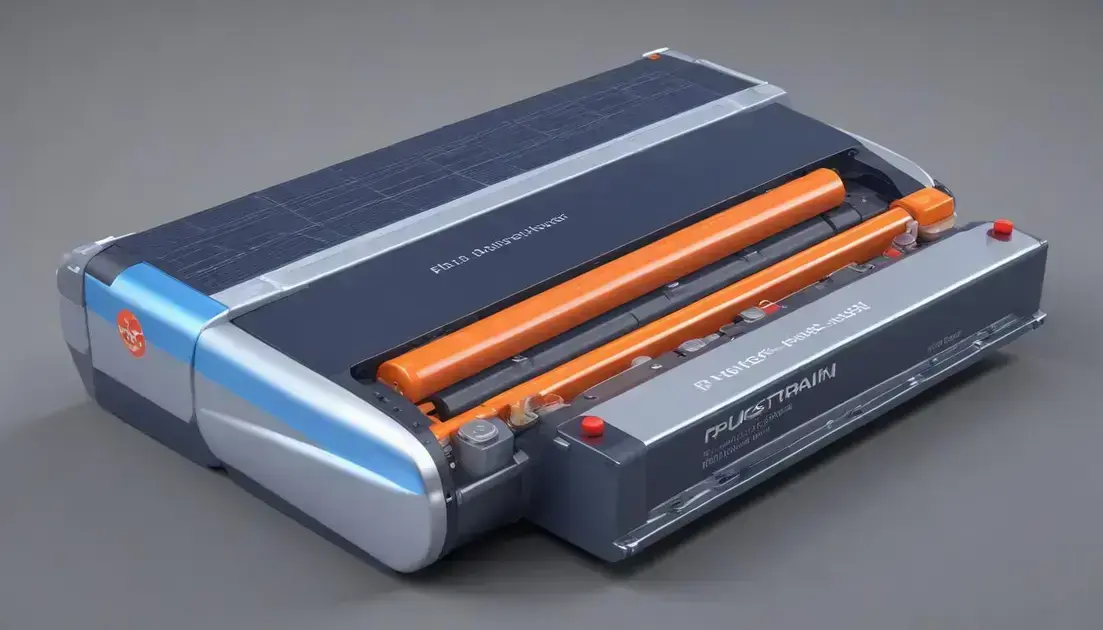Fundraising success: Pulsetrain raises €6.1 million
Pulsetrain’s innovative battery technology significantly enhances electric vehicle performance by improving energy density and charging speed while prioritizing sustainability, making it a key player in the future of eco-friendly transportation solutions.
EV battery technology is evolving rapidly, as evidenced by Pulsetrain’s recent fundraising efforts. But what does this mean for the future of electric vehicles?
Pulsetrain’s innovative battery technology
Pulsetrain’s innovative battery technology represents a significant leap forward in the electric vehicle sector. This new approach focuses on enhancing energy density and charging speed, crucial factors for the growing demand for electric vehicles. By utilizing advanced materials and engineering techniques, Pulsetrain aims to develop batteries that not only last longer but also charge faster than traditional options.
One of the standout features of their technology is the integration of proprietary manufacturing processes that streamline production while reducing costs. These processes are designed to improve output efficiency and lower the overall environmental impact, which resonates well with sustainability efforts in the automotive industry.
Furthermore, Pulsetrain’s commitment to innovation includes rigorous testing protocols to ensure that their batteries meet the highest standards of safety and performance. This commitment is vital as consumers increasingly prioritize reliability when it comes to electric vehicles. As the company continues to develop its technology, the potential for partnerships with leading automotive manufacturers could significantly accelerate the adoption of new battery solutions.
Funding details and its significance
The recent funding round for Pulsetrain raised an impressive €6.1 million, marking a significant milestone that speaks volumes about the confidence investors have in their technology. This capital aims to accelerate research and development, enabling the company to refine its battery technology and bring it to market faster.
This funding is not just a financial boost; it highlights the growing interest in sustainable energy solutions. As the demand for electric vehicles continues to rise, the need for efficient and reliable battery systems has never been more pronounced. Investors are keenly aware that innovations in this space could yield substantial returns as companies pivot towards greener alternatives.
Moreover, the backing from both private and institutional investors reinforces the notion that clean technology is becoming increasingly mainstream. This trend could catalyze further investments in related sectors, fostering a wider ecosystem of sustainable practices. Through strategic use of these funds, Pulsetrain aims to establish itself as a key player in the competitive landscape of EV battery production, paving the way for breakthroughs that can reshape the industry.
Impact on the electric vehicle market
The impact of Pulsetrain’s innovative battery technology on the electric vehicle market is poised to be transformative. As consumer demand for eco-friendly transportation escalates, the need for high-performance batteries becomes paramount. Pulsetrain’s advancements promise not only improved efficiency but also the potential for lower costs, which could significantly influence vehicle pricing.
With the ability to enhance vehicle range and reduce charging times, Pulsetrain’s batteries could change how consumers view electric vehicles. Increased performance can attract a broader audience, leading to higher adoption rates. As a result, traditional automakers may also be compelled to innovate further, fostering a competitive landscape.
Moreover, the environmental benefits associated with better battery technology align with global sustainability goals. As manufacturers work towards reducing their carbon footprints, adopting Pulsetrain’s technology could provide a critical advantage. This shift could accelerate the transition away from fossil fuels, marking a significant step toward a greener future.
Investors and stakeholders are keenly watching these developments, understanding that advancements in battery technology will dictate the future success of the electric vehicle industry. Firms that embrace such innovations early on may reinforce their positions as leaders in the evolving automotive market.
Future of sustainable battery solutions
The future of sustainable battery solutions is increasingly bright, driven by innovations in material science and engineering. Companies like Pulsetrain are at the forefront, focusing on creating eco-friendly batteries that prioritize both performance and environmental safety. These advancements are aimed at minimizing the carbon footprint typically associated with battery production.
Recycling and circular economy principles are becoming integral to battery technology. The emphasis on recycling materials not only reduces waste but also lowers the need for virgin resources. This shift promotes a more sustainable lifecycle for batteries, which is crucial as electric vehicle adoption soars.
Research into alternative materials, such as sodium-ion and solid-state batteries, shows promise by offering safer and less environmentally damaging options. These innovations could eventually replace traditional lithium-ion batteries, addressing concerns around resource scarcity and environmental impact.
As companies enhance their technologies, governments and industries will likely respond with increased support and regulations aimed at fostering a sustainable future. The collective efforts to develop greener battery solutions could redefine the energy landscape and align with global sustainability goals, ultimately leading to a cleaner and more efficient energy system.
Looking Ahead: The Future of Electric Vehicle Battery Technology
The advancements in battery technology, like those from Pulsetrain, clearly show how important innovation is for the electric vehicle industry. These developments not only promise better performance but also focus on making batteries more sustainable and environmentally friendly.
As the demand for electric vehicles continues to grow, these new battery solutions can help meet consumer needs while also addressing global sustainability goals. By focusing on recycling and using alternative materials, we can create a cleaner energy system for the future.
It is an exciting time in the field of electric vehicles. With continued investment and innovation, we can look forward to a future where electric vehicles are accessible, efficient, and environmentally responsible. Embracing these changes will be crucial for manufacturers, consumers, and the planet.
Frequently Asked Questions
What is Pulsetrain’s approach to battery technology?
Pulsetrain focuses on innovative battery solutions that enhance energy density, charging speed, and sustainability while minimizing environmental impact.
How does new battery technology impact electric vehicles?
New battery technology improves vehicle range and charging times, making electric vehicles more appealing to consumers and accelerating adoption.
Why is sustainability important in battery production?
Sustainability is crucial as it reduces the carbon footprint and resource depletion associated with battery production, supporting global environmental goals.
What role do recycling and alternative materials play in battery technology?
Recycling and using alternative materials help create a circular economy, reducing waste and reliance on scarce resources while enhancing battery safety.
How can advancements in battery technology influence market competition?
Advancements can drive competition among automakers, pushing them to innovate further and offer better electric vehicle options to consumers.
What should consumers look for in future electric vehicle batteries?
Consumers should look for batteries that offer improved performance, lower costs, and more sustainable production practices, ensuring they make eco-friendly choices.






